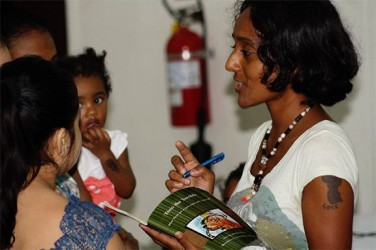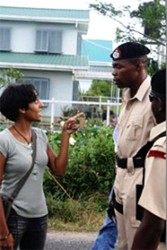The issues that push activist Sherlina Nageer into action can vary from a boy’s genitals burnt by the police, protestors shot and killed, a woman dying after an illegal abortion, a child being raped or just a woman suffering a mental health breakdown.
Injustice suffered by any human being or even animals are the driving force behind her activism and for her remaining silent it is not an option.
She knows that many might not agree with her style of activism and some even call her crazy but at the end of the day it is not about her but those who are suffering and have no one to stand for them. She cannot remain quiet about injustice.

“Anything that has to do with injustice and violation of people’s rights gets me fired up,” Nageer told the Sunday Stabroek in a recent interview.
And it is that fire in her that would have made her confront Minister of Health Dr Bheri Ramsaran last Monday. His verbally abusive response, she admits, shocked even her who has faced all sorts. But what shocks her more is the support he has since received from men and women alike who just can’t wrap their heads around the fact that what the minister did was wrong—plain and simple.
Such attitudes, coupled with other negatives cause Nageer to sometimes struggle with frustration and depression, but she said the struggle is real and she cannot stop being who she is.
“I have a lot of love for Guyana and I think it was a good thing to come back… There are a lot of positives to living here but there are also a lot of negatives and sometimes it feels like the negatives outweigh the positives and sometimes it feels like you are just banging your head against that wall and just getting a bloody head and the wall is still there,” she said.
Nageer does not “really care” about what people have to say or think about her, attributing this to her having a strong sense of self and feeling that what she is doing is not wrong and doing what she sometimes thinks is necessary.

“I know a lot of people wouldn’t agree with how I do things, or why I do things or the issues I bring out and that’s fine we don’t all agree on everything but that is what I care about and that’s what I feel is important,” she said.
She is not cursed on the streets or called names; most of the venom spewed at her is on social media, particularly Facebook. As such Nageer is not adversely affected by the name calling.
“People could say whatever they want to say, be as hateful as they want but really I feel sorry for them more than anything that they are not seeing the light. Not that my way of doing things is the only way but when you are not even open to discussion or discourse… The level of brain washing or denial is incredible,” she said.
The vulnerable
Health-related issues and those affecting women, children, vulnerable communities including LGBT, and poor people are all areas which prevent Nageer from remaining silent.
It is because many women and children continue to die in the health system that Nageer confronted Ramsaran. Two decades after Guyana passed legislation that makes abortion legal it is still not being done at the public institutions and women who can’t afford the private institutions prices turn to doctors who are not licensed to perform the procedure. Some die—there have been two deaths already for the year—but Nageer said while others don’t die many of them are maimed and have to live with the debilitating effects for the rest of their lives.
Then there are expired medications, facilities without running water and pregnant women having to fetch water to flush toilets. According to Nageer, she had visited a hospital in Linden twice with a child who needed Panadols and saline but the institution had none. The lack of rape kits at the hospital, which are vital for preserving evidence, is also an issue for the activist, who has a Master’s in Public Health. “It’s basic things. I am not talking about brain surgery. I don’t think we need a specialty hospital; fix the current facilities you have. If they were running smoothly, fine you could move up…,” she said.
Nageer, who also holds a BSc in Biology, said her training is in Public Health and she has always been involved in this area.
She left Guyana at age 12 and upon her return in 2009, 20 years later, she did some consulting work with SASOD focusing on issues the LGBT community has in accessing health care and confidentiality issues among others. She also worked with Red Thread and is still connected to the NGO. Nageer also does not want to hide the fact that she is a member of the LGBT community and maintains that persons should not be discriminated against because of their sexuality.
She had done a lot of HIV/AIDS work in the US and right before she came back to Guyana she was working with a health care non-profit in New York which dealt with ensuring immigrants had access to health insurance.
Going to the US was never Nageer’s desire but at 12 she did not have a choice; she always knew that she would have returned one day. She choose to study health as she saw that was the way she could contribute wherever she goes.
Her close family all live in the US and Nageer admits that her parents especially worry about her. At first they thought she was crazy when she became immersed in her advocacy work and have not gotten used to it. “My mom is still like, ‘when you coming back?’ She really doesn’t understand…
“I haven’t really used my degree in a concrete way. I feel like I am still using it in kind of like I have to create the connections. But I haven’t used it formally so in a way I feel a bit stagnated,” she admitted.
It is not that there have not been
opportunities since she returned to Guyana, but Nageer said she is not prepared to make compromises. That being said, she still feels she made a good decision and she feels happy to be in Guyana.
“I feel like I am contributing even though it is frustrating. But… I don’t want to go back and live in America, if anything I would go and live somewhere else in the Caribbean or the developing world.”
Twyon Thomas
When she returned to Guyana her first picketing exercise was supporting Red Thread’s moves to get the Sexual Offences Act passed but it was the police torture of Twyon Thomas, the 14-year-old whose genitals were burnt in 2009, that really opened her eyes to the way things were in Guyana at the time.
And it also exposed her to the apathy of the Guyanese society most of whom did not appear to be outraged at the dastardly act; when a protest action was called just about six persons supported it.
“It was raining outside the Leonora Police Station and there were just about six women and I was like ‘this is the Guyana, okay’. I thought people would have been up in arms about that because you know it was such an egregious violation…,” she pointed out.
People were passing them straight and those who lived close by refused to even hold a placard for two minutes.
“I have been here five, six years and I still don’t really understand why people are like that, fear yes that’s part of it but a lot of the fear is self-imposed…,” she said while questioning how Guyanese have lost their own power and sense to effect change.
Nageer volunteers at the Drop-in Centre and because she does not have a strict work schedule there is a lot of time for her to relax and do the things she likes, including reading, writing and feeding stray animals. She has published two children’s books to date and writes a fortnightly column on health and wellness for the Stabroek News.
“A lot of time is spent supporting somebody in some way, somebody is having a mental health crisis, needs someone to go to court with them…,” she said.
The killing of the three protestors in Linden in 2012 still resonates with her and this propelled her and others to start what was called the People’s Parliament which saw men and women remaining in the park opposite Parliament Building 24 hours for ten weeks.
“At the People’s Parliament we had a lot of engagement… Being right across from Parliament, seeing how people live on the streets…” Nageer said adding that it still makes her sad that the park is now fenced up with a gate.
This was done by the Ministry of Housing to force the group out of the park.





